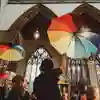From Noah to Now
A cultural history of flooding in English coastal and estuary communities

Project summary
The Challenge
How can we harness the creative power of the arts and humanities to engage coastal communities with rising risks of flooding today?
The Approach
We are working with schools across the Humber region to explore stories of flooding through literature, music, opera, and song.
The Outcome
Over 200 young people participated in opera performances that demonstrated a key role for the arts and humanities in teaching climate and sustainability in schools.
Institutes and centres
Lead academics

Using literature and opera to live better with water
What lessons do stories of flooding from England’s east coast contain for these coastal communities today? We are using literature and opera to raise awareness of flooding in creative ways, connecting communities across the Humber region in a celebration of stories, performance, and song.
The Challenge
The IPCC (2022) has reported that climate change is increasing the frequency and severity of coastal flood hazards, and the Environment Agency's National Flood and Coastal Erosion Risk Management Strategy for England (2022) notes an urgent need to cultivate 'climate resilience' in coastal regions.
But there are also significant challenges to coproducing climate action in some English coastal and estuary communities where embedded inequalities are not only impacting on education and wellbeing but on environmental resilience.
How might we harness the creative power of the arts and humanities to raise awareness of flooding in coastal community schools?
From Noah to Now works with schools and communities with experiences and memories of recent flooding, from the flooding that affected parts of Lincolnshire in January 2025, to the devastating 2007 floods in Hull, which saw over 10,000 homes damaged by flood water.
Project Team
The Approach
From Noah to Now sets out to use stories of living with water and flood to engage young people living in communities at risk of flooding and to equip them with the necessary cultural capital to enable them to communicate, contextualise, and historicise today's water risks in locally meaningful ways.
The project pioneers arts and humanities approaches to teaching the topic of flooding in schools by collaborating with project partner Hull Music Service; with primary schools located in areas of Hull and Grimsby that have been identified by UK Government as priorities for flood risk awareness campaigns; and with a production team led by artistic director, Lisa Coates to co-produce community performances of Benjamin Britten's east coast opera, Noyes Fludde (1958), at Hull and Grimsby Minsters.
School children on a field trip to Hull’s tidal barrier with Lauren Murtagh, from Hull City Council’s Living with Water team
East coast communities have always lived with flooding, and flood risk leaves its mark on the literature and culture of the English east coast across time. Britten’s opera is itself shaped by the experience of flooding. It was composed soon after the 1953 North Sea Flood that devastated east coast communities and even flooded Britten’s own coastal home. From Noah to Now explores these ‘water marks’ in literature and opera, and the lessons they contain for communities living with flood risk today.
The project measures ways that our work in schools is improving flood risk awareness and resilience across the Humber region. We use fieldwork findings from our case study region to inform recommendations for future uses of flood stories in classrooms and communities across England and Wales.

Watch our short film about From Noah to Now
5 mins
The Impact
The project’s uniquely interdisciplinary approach fuses the sciences, arts and humanities to explore innovative new ways of reading literature, theatre, and opera, and new ways of communicating coastal flood risks to schools and communities.
Our findings will therefore be wide-reaching and transformative, for English Literature and Environmental History, for climate and sustainability education in schools, and for young people, who are likely to be most impacted by future flood risks, and who therefore have most need for the arts and humanities-led strategies we develop in this project.
Project outcomes
- Charts connections between literature and the lived experience of flooding across centuries of coastal writing, drawing on the disciplines of Geography and Environmental History to create new histories of literature and new approaches to key writers, from Chaucer and Shakespeare to contemporary climate fiction.
- Applies these new histories of literature to create new ways of learning about climate and sustainability in schools. Working closely with schools and young people, we show how young people can engage effectively with climate and sustainability topics like flooding through reading, performance, and song.
- Communicates these findings to academic and policy audiences at various scales, so that more young people can benefit from our learning in future.
Colourful post-it notes with children's writing and drawings



